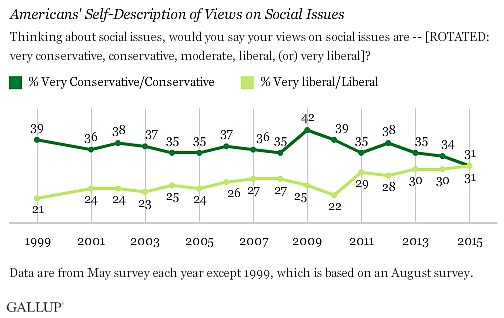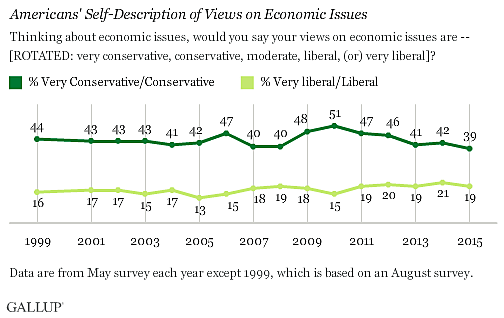Gallup’s latest report of American ideology shows the public is becoming increasingly socially liberal but not more economically liberal. Putting these trends together, you have an increasing number of Americans who are both socially liberal and fiscally conservative. This is probably why pundits are talking about a libertarian impulse trending in the United States. America is not becoming more liberal across the board, we are becoming more libertarian on social issues. In sum, the country is more libertarian today in 2015 than it was 10 years ago.
Social Liberalism on the Rise
Since the late 1990s Gallup has tracked the share of Americans who say their views on social issues are “liberal” or “very liberal.” In 1999 Americans were nearly twice as likely to say they were socially conservative as socially liberal (39 to 21 percent). However, throughout the 2000s the share of Americans who viewed themselves as liberal on social issues has steadily increased. In Gallup’s latest poll, Americans are equally likely to say they are socially liberal as socially conservative (31 percent each).
The rise in social liberalism is largely due to Democrats’ embracing the term rather than Republicans becoming more liberal. In 2015 fully 53 percent of Democrats say they are social liberals, up from only 38 percent 10 years ago. Among Republicans there has been no significant change in the share who say they are social liberals. Compared to 10 years ago, almost the same share of Republicans say they are social conservatives. However, there was a surge in social conservatism on the right between 2007 and 2012, reaching 67 percent in 2009. From that, there has been a marked decline to 53 percent. Only 11 percent of Republicans say they are social liberals, while 8 percent used the label 10 years ago.
Fiscal Conservatism Maintains Strong Advantage
Nevertheless, despite the 2008 Financial Crisis and Great Recession, talk of who built what and who’s paying their fair share, Americans continue to see themselves as fiscal conservatives by a wide margin. Gallup found that 39 percent of Americans self identify as fiscal conservatives compared to 19 percent who say they are fiscal liberals—a 20-point advantage.
Since 1999, there has been no significant change in the share of Americans who view themselves as “liberal” on economic issues—16 percent in 1999 and 19 percent in 2015. There has been a slight decline in the share who view themselves as economically conservative from 44 percent in 1999 to 39 percent in 2015. However, there was a marked increase in self-identified fiscal conservatives between 2009 and 2012, when more than half identified as such. However, this share has since declined to 39 percent. There appears to be a reversion to the mean in American fiscal attitudes.
On economic issues, Republicans and Democrats have further diverged. Republicans are slightly more likely in 2015 to identify as fiscal conservatives (64 percent) compared to 2001 (60 percent). However, there was a surge in Republicans’ fiscal conservatism in the middle of the decade that has since begun to subside. Self-identified fiscal conservatives among Republicans surged from 58 percent in 2005 to 76 percent in 2010 at the height of the tea party wave in the aftermath of TARP, the stimulus, and passage of the Affordable Care Act. Since 2012, economic conservatism has begun to recede back to pre-Recession levels among Republicans.
Democrats are becoming more economically liberal. In 2001 30 percent of Democrats said they were fiscal conservatives, compared to only 18 percent in 2015. While the share of fiscally moderate Democrats has remained steady, the share of fiscally liberal Democrats has increased from 22 percent 10 years ago to 33 percent in 2015.
Election 2016
The American electorate is more libertarian in 2015 than it was a decade ago. Candidates seeking the presidency in 2016 will face voters more open to the rhetoric of inclusivity, legalizing same-sex marriage, and marijuana legalization, but about where they were 10 years ago on economic issues.
There has not been a clear shift to the left on all issues, but primarily on social and cultural issues. Consequently, Republican candidates may find themselves rewarded by toning down the harsh rhetoric on social matters and immigration and promoting fiscal responsibility and free markets. However, while Democrats may benefit from trending social liberalism, they should be careful to avoid staking economic positions that are perceived as too liberal.
In sum, while this is certainly not always the case, candidates leaning in a more libertarian direction will likely be benefited at the polls.


